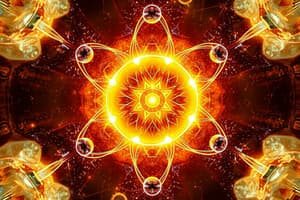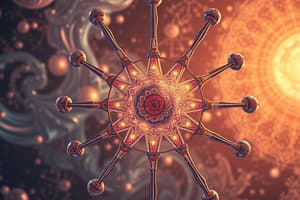Podcast
Questions and Answers
What is the formula for the ammonium ion?
What is the formula for the ammonium ion?
- NH4+ (correct)
- NH2+
- NH3+
- NH4-
Which of the following is the correct formula for the carbonate ion?
Which of the following is the correct formula for the carbonate ion?
- CO2-
- CO3
- CO32- (correct)
- C2O4-
What is the correct formula for the nitrate ion?
What is the correct formula for the nitrate ion?
- NO2-
- NO4-
- N2O2-
- NO3- (correct)
Which of the following ions has a formula of Ag+?
Which of the following ions has a formula of Ag+?
What type of compound is formed by oppositely charged ions held together by electrostatic forces?
What type of compound is formed by oppositely charged ions held together by electrostatic forces?
What defines the atomic number of an element?
What defines the atomic number of an element?
Which statement correctly describes isotopes?
Which statement correctly describes isotopes?
What does mass spectrometry measure?
What does mass spectrometry measure?
Which particle in the atom has no charge?
Which particle in the atom has no charge?
What is defined as the total number of protons and neutrons in the nucleus of an atom?
What is defined as the total number of protons and neutrons in the nucleus of an atom?
Flashcards are hidden until you start studying
Study Notes
Atomic Structure
- Atomic Number: Indicates the number of protons in an atom's nucleus, determining the element's identity.
- Bohr Model: Represents an atom with a dense nucleus surrounded by orbiting electrons, helping explain periodic properties.
- Electron: A negatively charged particle with a relative mass of 1/1836, orbiting at various energy levels.
- Neutron: A neutral particle in the nucleus, with a relative mass of 1.
- Proton: A positively charged nucleus particle also with a relative mass of 1.
Isotopes and Mass
- Isotopes: Variants of the same element with identical protons/electrons but differing neutron counts; result in varying masses.
- Mass Number: Total count of protons and neutrons in the nucleus of an atom.
- Relative Atomic Mass: Average mass of an atom, weighted against 1/12th of carbon-12's mass.
- Relative Isotopic Mass: Mass of an individual isotope compared to 1/12th of a carbon-12 atom.
- Relative Formula Mass: Mass of a giant structure's formula unit; for instance, NaCl has a mass of 58.44 g mol-1.
- Relative Molecular Mass (Mr): Mass of a simple molecule.
Mass Spectrometry
- Mass Spectrometry: A technique providing accurate data on relative isotopic mass and isotopic abundance.
Ions and Their Symbols
- Ion: An atom or molecule with a net charge due to loss or gain of electrons.
- Ammonium ion (NH4+): Positively charged polyatomic ion.
- Carbonate (CO32-): Negatively charged ion comprised of carbon and oxygen.
- Hydroxide (OH-): Negatively charged ion featuring oxygen and hydrogen.
- Ionic Compound: Formed from oppositely charged ions held by electrostatic forces.
- Nitrate (NO3-): A negatively charged ion containing nitrogen and oxygen.
- Silver ion (Ag+): A positively charged ion of silver.
- Sulfate (SO42-): Negatively charged ion consisting of sulfur and oxygen.
- Zinc ion (Zn2+): A positively charged zinc ion.
- State Symbols: Notations in chemical equations indicating the physical state of compounds: (g) for gas, (l) for liquid, (s) for solid, (aq) for aqueous solution.
Studying That Suits You
Use AI to generate personalized quizzes and flashcards to suit your learning preferences.




